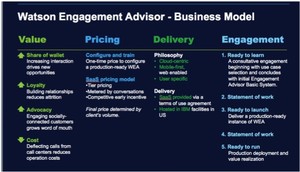IBM Watson Engagement Advisor
Addressing Customer Support Using Cognitive Technology
Watson Engagement Advisor is a new, innovative, and visionary virtual assisted-service offering. Its implementation and use of cognitive technology give it the power to answer a wide range of types of customers’ questions—simple facts, definitions of terms, descriptions of topics, yes/no or true/false, the steps in a procedure, or an approach to trouble shooting a problem. Large organizations with appetites for leading edge technology should consider Watson Engagement Advisor to add across-channel virtual assisted-service to their customer service application portfolio. Watson Engagement Advisor offers the potential to transform customer service.
NETTING IT OUT
Watson Engagement Advisor is a new virtual assisted-service offering from IBM.
Organizations purchase subscription licenses for cloud deployment of Watson Engagement Advisor. To date, we estimate that approximately 10 end-customers and 10 partners have licensed it.
Watson Engagement Advisor earns a good report card. The product earns Exceeds-Requirements grades in Knowledge Management and in Analysis and Matching. These are the most important evaluation criteria for virtual assisted-service products. We found that Watson Engagement Advisor was innovative, powerful, and flexible in both these areas. Its Needs-Improvement grades in Customer Service Integration, Analytic Functionality, and Product Viability result from its newness. Expect IBM to address all three areas with improvements in future product versions, and expect its small customer base to get larger.
Use Watson Engagement Advisor to deploy virtual agents who understand English language questions on web and mobile self-service channels and in contact center assisted-service channels to answer many types of customers’ questions—simple facts, definitions of terms, descriptions of topics, yes/no or true/false, the steps in a procedure, or an approach to troubleshooting a problem.
We recommend that large U.S. organizations in financial services, telecommunications, healthcare, high-tech, and retail, with appetites for leading edge technology and software developers that would like to sate those appetites, consider Watson Engagement Advisor to add across-channel virtual assisted-service to their customer service application portfolio. Watson Engagement Advisor offers the potential to transform customer service.
 CUSTOMER SERVICE
CUSTOMER SERVICE
Answer Customers’ Questions and Solve Customers’ Problems
Customer service applications help organizations deliver answers to their customers’ questions and solutions to their problems through their case management, knowledge management, search, account management, and social network management capabilities, capabilities that support self-service, assisted-service, and social-service channels. These products help answer and solve customers’ questions and problems about products and services; about business policies, processes, and practices; or about the elements of their customer relationships such as accounts, bills, orders, and contracts.
Virtual Assisted-Service—Customer Service Delivered Software
Virtual assisted-service applications use software to:
- Solicit and receive customers’ questions within a box on a web page, similar to the box for a chat session or in speech.
- Analyze customers’ questions to determine its meaning, its intent. Analyses are typically natural language processing (NLP) and linguistic analytics.
- Match a customer’s question to the answer within a collection of answers, typically predefined answers that best matches it. Matching might use any of NLP, machine learning, or cognitive reasoning technologies. The collection of predefined answers is a knowledgebase.
- Deliver the best answer(s) to customers within the box on the web page.
Virtual assisted-service is virtual because it uses software to determine and to deliver answers to customers’ questions. It’s assisted-service because, from the perspective of the customer, it solicits questions and delivers answers in the style that live agents/customer service reps deliver answers on assisted-service channels. However, from the perspective of the customer service provider, virtual assisted-service is self-service. Its agents are implemented in software. They are virtual agents, the faces/avatars and the voices of virtual assisted-service technology.
Customers use virtual assisted-service from self-service activities when they have difficulty getting answers to their questions using traditional web facilities such as search, knowledgebases, and portals, and when they use their mobile devices to speak questions and receive spoken (or textual) answers. Customers escalate to assisted-service from virtual assisted-service when virtual agents cannot answer their questions satisfactorily or when virtual agents suggest that live agents/reps should be contacted.
Virtual Assisted-Service Can Be a Low(er) Cost Customer Service Channel
Virtual assisted-service can be a low(er) cost customer service channel. It’s customer service software, not customer service staff. It can lower cost-to-serve by avoiding or deflecting assisted-service chat sessions and/or contact center calls. It can also prevent or delay abandonment and improve customer satisfaction, delivering answers to customers who might otherwise leave rather than call.
The Best Virtual Assisted-Service—Easy, Fast, and Accurate
As it is for all customer service, the best virtual assisted-service is...(more)
(Download the PDF to read the entire article.)
Sign in to download the full article
0 comments
Be the first one to comment.



